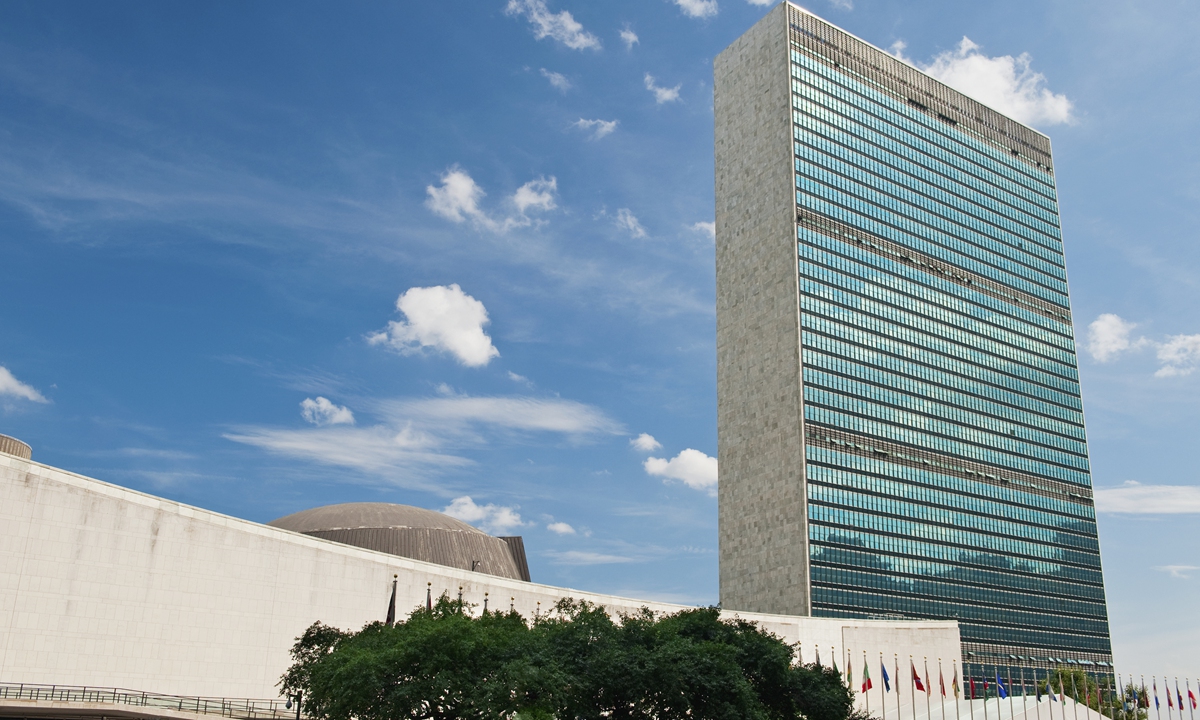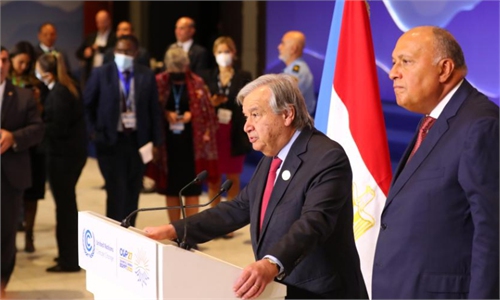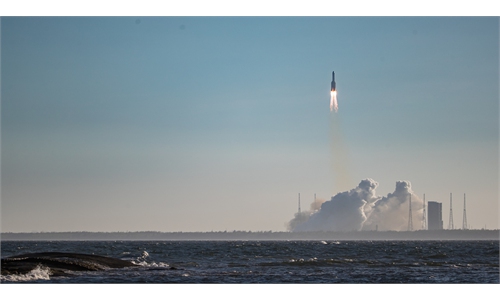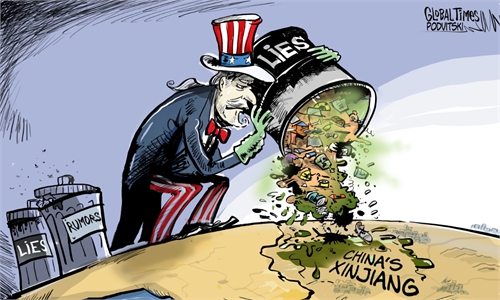
UN Headquarters in New York. Photo: VCG
Editor's Note:There is an information war going on. Fake news pushed by the Western mainstream media affects hundreds of millions of people. When the narratives are fake, democracy does not function because people don't know what they are voting for, said Alfred-Maurice de Zayas (De Zayas), former United Nations (UN) Independent Expert on the Promotion of a Democratic and Equitable International Order, in an interview with the Global Times (GT).
GT: Your book Building a Just World Order has attracted international attention. What are the reasons or driving forces for you to write this book?
De Zayas: I was UN independent expert for the United Nations High Commissioner for Human Rights for six years from 2012 to 2018. There is an information war going on. I believe in democracy, and if you believe in democracy, you need access to information, but what we get is selective and incomplete. When the narratives are fake, obviously, democracy does not function because people don't know what they are voting for.
The mainstream media, including The New York Times, The Washington Post, CNN, and the BBC, are full of fake news, and omissions of crucial information falsify the picture. The fake news about China, Russia, Syria, Libya, Venezuela, and Cuba significantly impacts the perception of reality by the 335 million US citizens and people in European countries including the UK, France and Germany. That has consequences, and you see it in the voting record at the UN General Assembly (UNGA) and the UN Human Rights Council (UNHRC). Thus, we have to push back against these fake news stories.
Building a Just World Order (2021) is the first book of my trilogy about human rights. This book put down 25 principles of international order, which we need if we want to save this planet. If we want world peace, we have to observe basic principles of coexistence. But the information war is making it more difficult to advance.
The second book Countering Mainstream Narratives came out in August 2022. I am almost finished with the third book The Human Rights Industry, which I expect to publish in April 2023. There are few people who can write on that subject as extensively as I can, because I have spent the last 50 years of my life as an NGO activist, consultant in human rights, senior lawyer at OHCHR and an independent expert on international order, and I have seen so much. I applaud the achievements of the human rights movement, but also denounce the abuses committed by what I call "the industry." And the industry is actually very powerful and well-financed. It uses NGOs to advance geopolitical goals instead of advancing human rights. They instrumentalize and weaponize human rights for ulterior purposes.
GT: There are some so-called NGOs in the world that, in essence, work as tools for a government. What is your view on these fake or pseudo NGOs?
De Zayas: Of course, there are plenty of fake or pseudo NGOs. We actually have a different name for them: We call them GONGOs - NGOs financed by the government, directly or indirectly. When they put their information on the internet, they can hide the source of the financing. But ultimately, many of them serve Washington or London.
I do consider that Hungarian Prime Minister Viktor Orban does have a point [when he accused some NGOs] because there's plenty of evidence that these non-governmental organizations in Hungary have engaged in subversion. Now, when I'm talking about subversion and massive election meddling, I do not only mean subverting government directly, which is easier to deal with. They are subverting the social fabric of civil society by introducing wrong information. They undermine the cohesion of a society. There are many very subliminal ways of doing that, such as the psychological operations carried out by NGOs.
Now, common sense indicates that if a good-faith NGO wants to operate [in other countries], then it has to be constructive. People welcome an NGO into their country if it is going to further the welfare of society or solve various social problems.
But if NGOs start meddling in areas of national security, that's a red line. The government has the right and responsibility to stop that. It is entirely within the right of a government to investigate whether these NGOs are genuine or if they are there for the purpose of destabilizing the country.
No matter how hard China, Russia, or others defend their national security from this kind of subversion, it will be denounced in Washington, as being contrary to human rights and as being a restriction of the right of freedom of expression. So, when you have been attacked with such fake arguments, you need to have a solid response to them. You should lay up all the evidences that can prove this organization is engaged in destabilization strategies.
GT: Over the past few years, especially after escalating China-US tensions, some NGOs have been very active in smearing China, such as Freedom House, International Foundation for Electoral Systems, and the International Republican Institute. In your opinion, what role do these NGOs play in discrediting China? Why are some Western forces so keen on smearing China?
De Zayas: It is shocking that instead of trying to build bridges so that we have a better understanding of our Chinese friends, whether Human Rights Watch, Freedom House, or any of these so-called NGOs, they are doing something totally contrary to the letter and spirit of the UN Charter. They are actually inciting a rejection of the Chinese people and Chinese culture. They want to isolate, exclude, and demonize it so that their ultimate interests, which are geopolitical or geo-economic, can be advanced.
Their smear activities are despicable. They should be denounced as a violation of Article 20 of the International Covenant on Civil and Political Rights. "Any propaganda for war shall be prohibited by law," states article 20. "Any advocacy of national, racial or religious hatred that constitutes incitement to discrimination, hostility or violence shall be prohibited by law."
An example of how unhinged these forces can be are the below-the-belt attacks on former UN High Commissioner for Human Rights Michelle Bachelet, who made an official visit to Xinjiang in May of this year. She gave a comprehensive and balanced end-of-mission report in Guangzhou on May 28 and announced that she had established a working group to facilitate OHCHR-China cooperation. She demonstrated approach and a readiness to cooperate with China to solve problems.
Unfortunately, after she returned to Geneva, she was badly mobbed by some "human rights NGOs" because they did not consider the mission useful. They didn't want Michelle to build bridges with China. The only function assigned to her was: Condemn China. These NGO's wanted Bachelet as the spear that would pierce China. Yet she did lend herself to that purpose. She was mobbed so badly that she did not seek reelection.
GT: Do you have suggestions for China on how to deal with such smears, mainly from the US?
De Zayas: The US is going to continue trying to thwart the Belt and Road Initiative (BRI) and defame China in the UNHRC and at the UNGA. Unfortunately, although I find this very distasteful, if someone insults you and you don't respond, some people will believe that some of the insults were valid.
I think that China has no choice but to respond. China can remind the US of its genocide against indigenous peoples and the massacres against the "Indians" from the Atlantic to the Pacific.
China should remind the UNGA that the only goal of the US is to try to encircle China. The US has said its security is threatened in the South China Sea and the Taiwan Straits. The US is exercising imperialism. The US has not quite grasped that the heyday of imperialism is over.
China should remind the world that it wants to have friendly relations with everybody, beginning with its neighbors. It wants the Belt and Road Initiative to be successfully completed, so it is concerned about the big destabilization that the US and NATO have conspired to do in Asia.
China could be the paragon of human rights to peace. It's quite clear that the priority for all of us has to be peace, because only if we have peace can we exercise our civil, political, economic, social, and cultural rights. With its growing prestige and influence economically and otherwise, I think China can launch several initiatives in the UN General Assembly. China could launch an initiative for a global pact on education for peace and empathy.
GT: Like many countries in Latin America, Africa, and Asia, China is facing some restrictions in global public opinion due to many factors. The West, or the US, still has the dominant position in leading global public opinion. Do you have suggestions to break the current situation?
De Zayas: If you are a typical Brazilian, Argentine, South African, or Ugandan who is not particularly interested in international affairs, you get your information from Western media. You always get propaganda against China. Therefore, China has no choice but to speak for itself. It should be more assertive about its own human rights achievements.
China can expand its influence in Latin America and Africa through the media. I am sure that China has the capacity to compete with the BBC; for example, China can put its documentaries on YouTube to make sure that Chinese culture is understood in the West.
I also believe China can advance in fighting the information war by using the mechanisms of the UN and UNESCO. People actually appreciate artists. I remember that Lang Lang is one magnificent pianist who has actually traveled the world to play piano. There are also many Chinese artists spreading Chinese culture around the world. That is all in the spirit of UNESCO.
GT: How should China deal with foreign NGOs? And what should Chinese NGOs do to protect China's interests?
De Zayas: There are plenty of NGOs that are in good faith, not against China and are not in the service of Washington or Brussels. China should also create its own NGOs and have a permanent presence in Geneva so that it can network with experts and ambassadors.
It is important because, as I said, the perception of reality is, in many ways, more important than reality itself. Now people have the wrong perception, which is created through subliminal psychological means, and have a huge impact on the status quo.
I must admit I'm writing about that in my third book in the trilogy about the penetration of the system by intelligence services. Whether it be the CIA or MI6, they have a presence in the Office of the High Commissioner for Human Rights and UNHRC. Therefore, it is important for China to know that it is not dealing with an impartial body. It should realize that it deals with a body that has an agenda that has, shall we say, certain commitments, and then it has to make sure that its interests are taken into account.



